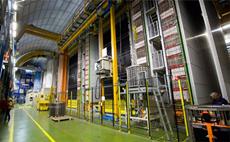Glitch may be behind “faster than light” effect: CERN
24 Feb 2012
In what might come as a major embarrassment for scientists who claimed that some particles may have the ability to travel faster than light, it is now suggested that this might have something to with faulty cabling or faulty time keeping.
 In September, scientists at the European Organization for Nuclear Research, or CERN, said that ghostlike particles called neutrinos travelled at blazing speed exceeding that of light from a lab in Geneva to one in Italy making the trip in 60 nanoseconds, a finding that was flashed in headlines the world (See: CERN Scientists say particles speeding faster than light found).
In September, scientists at the European Organization for Nuclear Research, or CERN, said that ghostlike particles called neutrinos travelled at blazing speed exceeding that of light from a lab in Geneva to one in Italy making the trip in 60 nanoseconds, a finding that was flashed in headlines the world (See: CERN Scientists say particles speeding faster than light found).
But there were many sceptical scientists said they were convinced that the result was an error.
It turns out the error may have been in the machine, and CERN said it had identified two possible effects that could have been responsible for the erroneous results: one relates to an oscillator used to provide time stamps for estimating particle speeds, and a possible glitch in a fibreoptic cable.
"If this is the case, it could have led to an underestimate of the time of flight of the neutrinos," CERN said in a one-paragraph "update" posted on its website. New measurements are planned in May.
Neutrinos are particles that bear no charge and have no mass, and they can pass through ordinary matter unaffected. Billions of these particles harmlessly stream through a person's body every second.
The experiment known as the Oscillation Project with Emulsion-Tracking Apparatus, measured neutrinos traveling somewhat faster than light on a 450-mile trip from CERN near Geneva to the Gran Sasso underground lab in central Italy. That result was observed in 15,000 neutrino events measured.


















